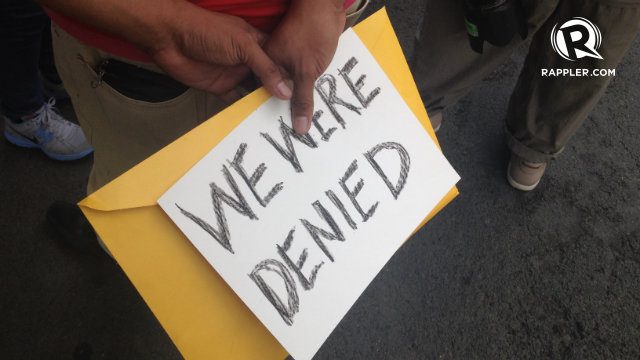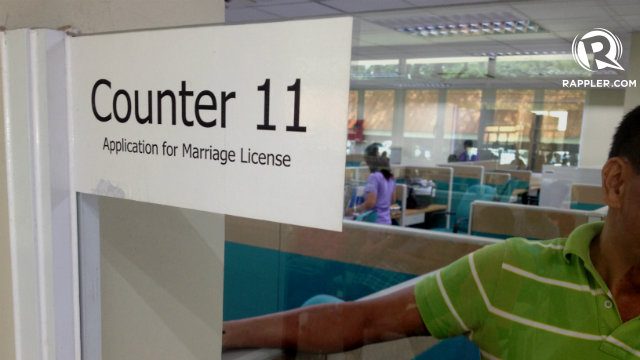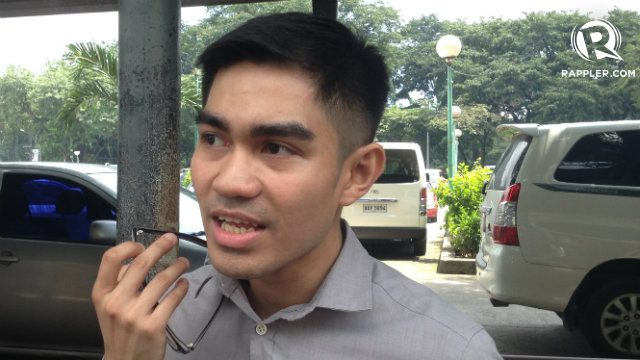SUMMARY
This is AI generated summarization, which may have errors. For context, always refer to the full article.

MANILA, Philippines — There will be no wedding bells.
On Monday, August 3, a small group of marriage equality advocates marched to the Quezon City Civil Registrar’s Office to apply for marriage licenses. Tucked beneath their arms were all the necessary paperwork plus a thin slice of hope.
Love, however, did not conquer. Their applications were not approved.
“Although we were expecting that we will be denied since same-sex marriage is not legal in the Philippines, we still tried filing,” Arlyn “Sugar” Ibanez, one of the marriage license applicants, told Rappler.

“Kasi mas gusto naming umpisahan ‘yung laban about sa equality kesa wala kayong ginagawa, ‘di ba?” Sugar added. (Because instead of doing nothing, we wanted to start the fight about equality.)
Sugar was joined by Reverend Crescencio “Ceejay” Agbayani Jr., the founding pastor of the lesbian, gay, bisexual, transgender, and straight (LGBTS) Christian Church Inc. Agbayani also applied for a marriage license for him and his partner of 10 years.
They were accompanied by lawyer Jesus Falcis, who filed a petition for LGBT rights with the Supreme Court (SC) in May 2015. Falcis’ petition, a first of its kind in the Philippines, stressed the need to lift same-sex marriage prohibitions in the country’s 30-year-old Family Code.
It was filed just days before Ireland, another predominantly Catholic country, approved same-sex marriage.
Quezon City is among the few local governments that implement its own anti-discrimination policy, in place of a national law. The ordinance protects residents from discrimination based on their sexual orientation and gender identity (SOGI), as manifested in unfair treatment, school bullying, employment biases, and hate crimes as in the murder of Jennifer Laude.
“I feel rejected. It hurts to be denied by your own city hall, knowing the fact that Quezon City has an anti-discrimination ordinance,” said Agbayani. “But I don’t blame Quezon City, we blame the fact that there really is no law. I understand they’re just following the law. It’s good they (registry office) were kind to us.”
“In QC, there’s an ordinance which allows you to complain if you experience discrimination at work or establishments. It’s good thing, a first step,” said Sugar. “Hopefully, it will be implemented nationwide.”
Sugar’s wish, however, has been hanging for over a decade. The Anti-Discrimination Bill remains pending in the Congress, with only a few legislators actively supporting it. The bill not only covers SOGI-based discrimination, but also ethnicity, religion, disabilities, sex, age, health status, among other factors.
Next steps

Jun Adorna of the QC Registry Office has been processing hundreds and hundreds of marriage license applications over the years. This, however, was his first time to cater to same-sex couples.
Agbayani’s and Sugar’s application forms were not stamped “denied,” since it was not even officially “received,” according to Adorna. “Because once we receive it, it means we accept it. It’s not allowed since we don’t have a law yet,” he said.
After the encounter, Adorna shared his personal thoughts, “It’s not nice. How can two men or two women be together?”
The two couples felt defeated. Their fight, however, is yet to continue. They are planning to file a petition with the SC, with lawyer Claire Padilla of EngendeRights, a non-governmental organization pushing for equality. Falcis will serve as co-counsel.

The couples would then file cases to intervene with Falcis’ pending case, so the SC could consolidate them. “See you at the SC,” Falcis quipped.
“After I filed the petition, several LGBT groups, individuals talked to me. Some were exploring the option of helping in the case,” Falcis told Rappler. “Because in my case, I don’t have a partner, I filed alone. The strongest case possible is if there’s an actual gay couple.”
If the Philippines passes such law, it would be the first in Asia to do so. As of June 2015, there are only 22 countries that allow same-sex marriage nationwide, the Pew Research Center reported. (READ: US SC allows same-sex marriage)
The filing for marriage licenses in QC was initiated by the Philippine Marriage Equality Network, a group of religious and non-religious advocates. Simultaneous filings were also done in Baguio, Davao, and Silang, Cavite.
‘Inherent, not special’
Although advocates have been pushing for gender equality for several years, several Filipinos are yet to understand the logic behind the battle.
“It’s not a special right, actually it’s an inherent right,” Agbayani stressed. “It’s the right of all citizens in a civilized society to marry. We’re not asking for special rights since we’re not special people.”
A marriage equality law would grant same-sex couples the same government services that married heterosexual couples enjoy such as benefits in tax, SSS, PhilHealth, insurance, joint adoption, and family recognition.
“What we’re fighting for here is equal treatment. If one group is no different from another, then there should be no difference in their treatment,” said Falcis. “Gay and lesbian couples are no different. They can raise a child, they can love each other, live together and support a family.”
“So if there’s no difference, the law shouldn’t discriminate,” the 28-year-old lawyer added.
Sugar and Agbayani are thankful of advocates like Falcis, emphasizing the lack of lawyers who devote time for LGBT rights.
“God created another person who will fight for equality. We’ve been looking for a lawyer because this is a legal battle, not a religious one,” said the reverend.
“I’m 43 years old. I’m starting to weaken and age. I hope the government recognizes us,” Agbayani added. “I dont want to die without marriage equality.” – Rappler.com
Got stories to tell? Share your ideas and articles on LGBT rights, gender and development with move.ph@rappler.com. Speak up on #GenderIssues!
Add a comment
How does this make you feel?
There are no comments yet. Add your comment to start the conversation.